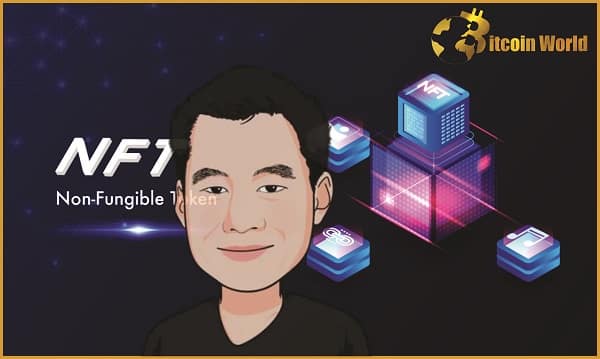Are you ready for the next big wave in crypto and gaming? Justin Kan, the entrepreneurial mind behind the streaming giant Twitch, is diving headfirst into the booming world of Non-Fungible Tokens (NFTs), but with a gamer-centric twist! Get ready to explore Fractal, the brand new NFT marketplace designed specifically for gaming enthusiasts.
What is Fractal and Why Should Gamers Care?
Justin Kan, known for his innovative ventures and co-founder of Atrium, a law-tech company, is now setting his sights on revolutionizing the way gamers interact with digital assets. Fractal is his latest brainchild – a marketplace exclusively dedicated to gaming NFTs. Imagine a platform where you can seamlessly trade, discover, and own unique in-game items as NFTs. That’s the vision behind Fractal.
In a recent announcement, Justin Kan articulated Fractal’s core mission:
“Our mission is to create an open platform for the free exchange of digital goods. We’ll do that by partnering with the best gaming companies launching NFTs and building tools that help them reach their customers at scale.”
This statement highlights a crucial aspect – Fractal isn’t just another NFT marketplace; it’s being built with a laser focus on the gaming community and the unique needs of game developers. This means we can expect a platform tailored to the specific dynamics of in-game assets and economies.
Solana: The Blockchain Powering Fractal
Fractal is built on the Solana (SOL) blockchain, a choice that speaks volumes about the platform’s intended user experience. Why Solana?
- Speed and Efficiency: Solana is renowned for its lightning-fast transaction speeds. For gamers, this translates to quick and seamless NFT trading, crucial for dynamic in-game economies.
- Lower Costs: Compared to Ethereum, Solana boasts significantly lower transaction fees (gas fees). This makes NFT trading more accessible and affordable, especially for smaller transactions and frequent trading – common activities in gaming ecosystems.
- Scalability: Solana’s architecture is designed to handle a massive volume of transactions, essential for supporting the potentially huge user base of a gaming NFT marketplace like Fractal.
Solana’s popularity in the NFT space is already evident. It consistently ranks among the top blockchains in NFT sales volume, proving its capability and growing adoption. Currently, Solana’s native token, SOL, is trading at approximately $159.87, reflecting the network’s strength and market confidence.
Fractal’s Two-Pronged Marketplace Approach
Fractal is designed with a dual marketplace structure to cater to different stages of NFT lifecycles:
- Primary Market: This will be the go-to destination for initial NFT drops directly from gaming companies. Think of it as the official launchpad for new and exciting gaming NFTs. Gamers will have the opportunity to acquire fresh NFTs directly from their favorite game developers.
- Secondary Market: Facilitating peer-to-peer transactions, the secondary market will allow users to buy, sell, and trade NFTs they already own. This creates a dynamic and liquid market for gaming NFTs, fostering a vibrant community of traders and collectors.
Beyond Trading: The Future of Fractal and Gaming NFTs
Justin Kan’s vision for Fractal extends beyond just buying and selling. He hints at exciting future possibilities, particularly within the burgeoning play-to-earn gaming sector:
“Eventually, we see ourselves creating infrastructure for emergent use cases of NFTs as well, such as the lending/scholarship model in some play-to-earn games.”
This points towards innovative features like:
- NFT Lending and Scholarships: Imagine lending out your valuable in-game NFTs to other players to earn passive income or participate in play-to-earn games without a hefty upfront investment. This could democratize access to play-to-earn opportunities and create new economic models within gaming.
- Emergent Use Cases: The NFT space is constantly evolving. Fractal aims to be at the forefront, adapting and integrating new and unforeseen applications of NFTs within gaming as they emerge.
The Potential Impact of Fractal on the Gaming and NFT Worlds
Fractal’s arrival could signify a significant leap forward for both the NFT and gaming industries. By focusing specifically on gaming NFTs and leveraging the power of Solana, Fractal has the potential to:
- Drive mainstream NFT adoption within gaming: A dedicated and user-friendly platform like Fractal can lower the barrier to entry for gamers to engage with NFTs.
- Empower game developers: Fractal can provide game studios with a robust platform to launch and manage their in-game NFT economies, creating new revenue streams and player engagement models.
- Enhance player ownership and control: NFTs empower players with true ownership of their in-game assets, allowing them to trade, sell, and utilize them across different platforms and games (in the future, potentially).
- Fuel the growth of crypto gaming and the metaverse: Fractal’s infrastructure can contribute to the development of richer and more immersive metaverse experiences where digital assets have real-world value and utility.
In Conclusion: Fractal – A Game Changer for Gaming NFTs?
Justin Kan’s Fractal is poised to become a major player in the NFT gaming space. By combining the expertise of a seasoned tech entrepreneur with the speed and efficiency of the Solana blockchain, Fractal offers a compelling platform for gamers and game developers alike. As the NFT gaming market continues to explode, Fractal’s specialized approach and focus on user experience could very well make it the go-to marketplace for the future of gaming NFTs. Keep an eye on Fractal – it might just be the platform that bridges the gap between traditional gaming and the exciting world of blockchain-based digital ownership.

Related Posts – Bank DBS’s Crypto Business Grows Massively Due To Growing Demand From Investors
Disclaimer: The information provided is not trading advice, Bitcoinworld.co.in holds no liability for any investments made based on the information provided on this page. We strongly recommend independent research and/or consultation with a qualified professional before making any investment decisions.


